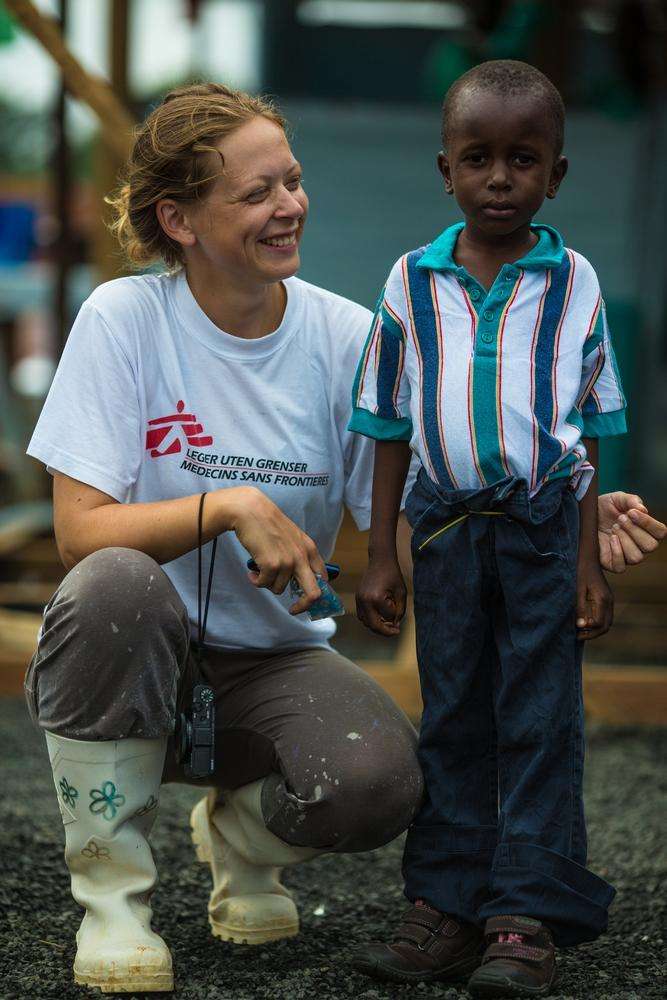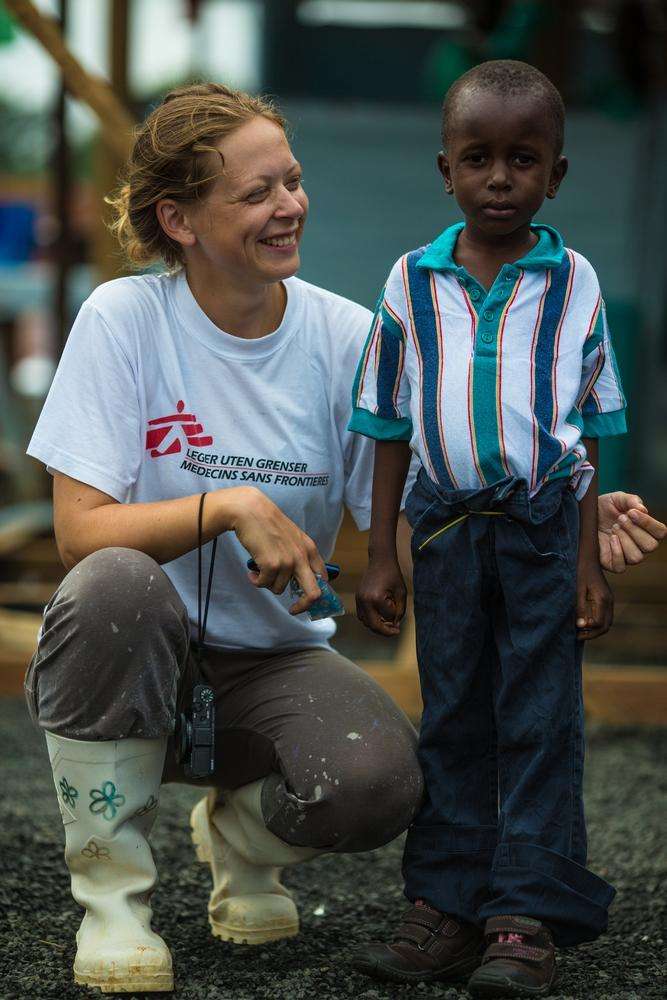Ane Bjøru Fjeldsæter is a 31-year-old psychologist from Trondheim, Norway. She recently spent one month working in the Doctors Without Borders/Médecins Sans Frontières (MSF) Ebola response in Monrovia. Here, she discusses her experience.
Liberia is divided by an orange double fence. We built it to keep the sickness at bay. We built it to separate us (the healthy, the privileged) from them (the sick, the needy). We built it to feel less mortal. We built it for the noble purpose of barrier nursing.
Patrick is on the inside, I am on the outside.
I see him every day, and we smile and wave at each other. Patrick is just a child, but he is hanging out with guys five times his age, as if trying to make up for the fact that he is much too young to die. They play checkers and poker when they have the energy for it, and they listen to BBC Africa on the radio I brought in one day in my space-invader outfit. Patrick has a shy, crooked smile and a bruise near his right eye. He has just lost his mother, but his father is with him in this horrible place.
Every day I tell myself, “Ane, don't lose your heart to this child who no longer belongs among the living. He is here for a week and then will be gone forever. How will you do your job once he has gone? Don't you know what you are dealing with here? ‘This Ebola business,’ as they say on the radio. A disease that carries a mortality rate of up to 90 percent. People on that side of the fence don't return to this side. You know that it is dangerous to get close.”
I tell myself this every day, and I never listen. It is impossible not to look out for his crooked smile once I arrive at work in the morning. It is impossible not to notice the small changes in his energy levels from day to day. I can't resist waving at him, or scanning his face and his medical chart for any indication, anything that will allow me to hope that he is taking a turn for the better—anything that will allow me to hope that we will play poker together one day, without all the bother of wearing a mask, goggles, and double gloves.
Then the horrible morning comes. The one I had tried to prepare for. The morning when Patrick is not waving anymore. I look across the fence and he is lying on a mattress in the shade. His group of friends tiptoe around him, looking concerned. I suit up. I fear the worst. I make my way through the ward. His father tells me Patrick has complained of stomach pains all night. Patrick has parched lips; feverish, shiny eyes; and none of his usual energy. He tries to smile when he sees me.
“Patrick, my friend, you don't look so well. It worries me to see you like this. Is there anything I can do for you?” I say.
He looks up, whispers something, and I lean closer in my bulky space suit. What did he say?
“Can you get me a bicycle?” he repeats.
Oh Patrick, where would you ride your bicycle? You loved your mother, and you were near her while she was sick. Now you are surrounded by orange fences and will never learn to ride a bike. Do you think this is just an upset stomach? Didn't your older friends tell you about Ebola? Or did they turn down the volume when BBC Africa told you that soon you would be defecating blood?
I make my way out. I don’t want to start crying inside the goggles. I hate myself for having met this kid. Why do I never stay at home?
The next morning, something drives me back. I want to be there for Patrick’s father, no matter what he is going through. He looks tired, but he grins as soon as he sees me across the fence. And slumped in the chair next to him, someone is sending me a crooked, shy smile. We wave.
I can see that Patrick doesn’t have the energy to leave the chair, so I get dressed in my suit and go inside. In spite of seeing only a fraction of my face, Patrick recognizes me:
“I see my friend. I don't see my bicycle!” he says.
I can't tell him I didn't think he would make it through the night. I try to find the right words. Can I say it slipped my mind? Patrick looks at me sternly.
“The lady forgets, but the man does not!” he says.
Oh Patrick, where do you pick this stuff up? Is this the kind of talk you hear from your entourage? Promise me you'll start hanging out with kids your own age one day.
Patrick was discharged last Sunday with his father. They both looked worn out. I could hardly believe that Patrick had healed from Ebola before the bruise near his right eye had faded. He had become so skinny that we had to tie his trousers up with a piece of string.
Being discharged from the center is a confusing affair. After weeks when people are afraid to go near you, suddenly they want to hug you and kiss you. It can bewilder anyone, even a worldly young man like Patrick.
On the rare occasions when somebody recovers, we provide them with a certificate of their negative status. Patrick Poopel, standing here on my side of the fence, smiling a shy smile, and holding his Ebola graduation papers, is ready to learn how to ride a bike.
Contrary to what you might think, Patrick, this is something “the lady” will never forget.





